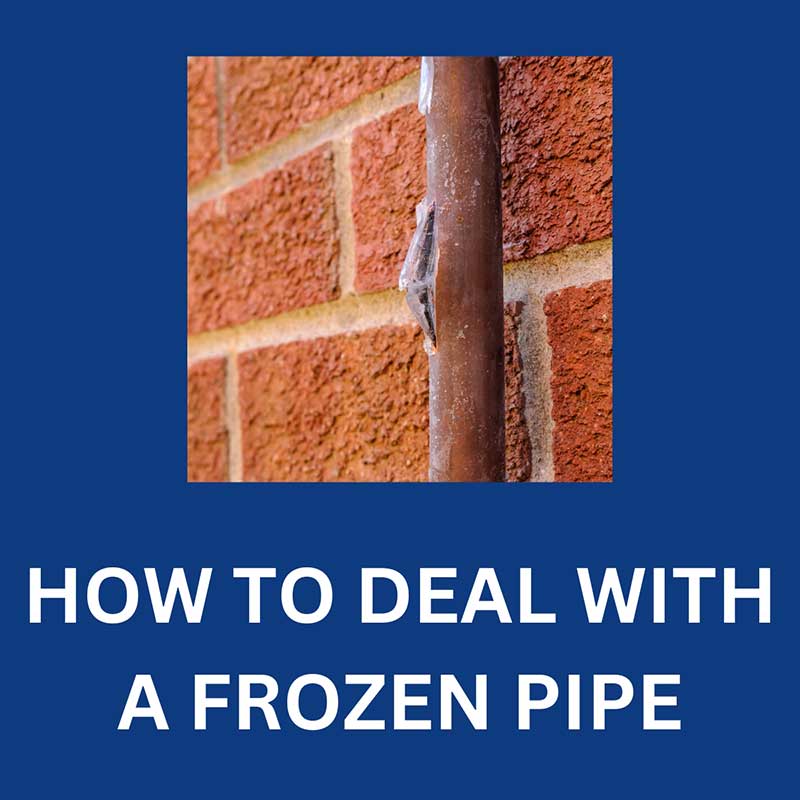
We are now fast approaching winter our busiest time of year. Plumbing emergencies are common for us throughout the winter months. One of the most common problems we encounter is frozen and burst pipes.
A frozen pipe will stop water flowing which can affect your heating and water supply.
Frozen water in a pipe will expand and can cause the pipe to burst. When the water thaws, you will have a leak which can cause thousands of pounds worth of damage.
Protection From Frozen Pipes
The first step is to protect yourself against frozen pipes which is inexpensive and straightforward. Insulating all pipes that are outside, in your loft or garage will stop pipes from freezing. Pipe insulation is very cheap and’s available in lengths from 1-7 meters.
Ensure you use the correct diameter of insulation which should match the pipe diameter. Pipe insulations available in widths of 15, 22 and 28mm. Measure your pipe before ordering your insulation.
When insulating your pipes make sure the whole pipes covered including bends and vales. Once your exposed pipe’s insulated make the insulation secure with tape or cable ties.
There are several other methods you can use to prevent frozen pipes, such as
- Fix Any Leaks
- Get Your Boiler Serviced Annually
- Check Your Mains Stopcock Is Working
- Drain The System
- Leave Your Central Heating On
Please see our burst pipe repair and prevention page for more information
How To Thaw A Frozen Pipe
If you discover a frozen pipe, it needs thawing ASAP before it splits. In the event of a frozen pipe, we will be happy to thaw it for you or you can even thaw it yourself.
Please be aware that by thawing a pipe yourself you can accidentally burst the pipe if you’re unsure we can defrost the pipe properly for you.
Whatever you do don’t leave it frozen, defrost it before the frozen water has a chance to expand further.
Check All Vulnerable Pipes
You might have more than one frozen pipe if one pipe is frozen chances are another one will be frozen as well. Turn on all your taps, if any tap has a slight trickle the pipe leading up to that tap’s frozen.
Turn Off Your Mains Stopcock
Shut off your water supply at the mains stopcock, and turn off your central heating system.
Open Affected Taps
Turn on the taps closest to your frozen pipe. Open both the hot and cold taps which will allow thawed water to escape and release pressure in the system.
Select A Defrosting Method
You can use an electric heater, a hairdryer (on a low setting), towels soaked in hot water or a hot water bottle to defrost a pipe. Never use a naked flame such as a blowtorch, this can damage your pipe and start a fire.
Start Thawing
Always start thawing the pipe as close as possible to the tap and work your way down to the blockage. This allows thawed water to escape and minimises the chance of a pipe bursting. Apply heat until the pipe has thawed and the water has flowed out of the tap.
Check Flow
Once you are confident, your pipe has thawed turn your mains stopcock back on. Turn on your taps and check the flow, if the taps delivering water at the normal pressure your pipe has defrosted properly.
Burst Pipes
In the event of a burst pipe shut off the water supply at the mains stopcock immediately. Use a bucket and towels to collect the water in the affected area. Switch off all electrical appliances near the burst pipe.
If you have a burst pipe please follow the steps above and call us on 01245 830075, our emergency Plumber will be with you within 2 hours.
